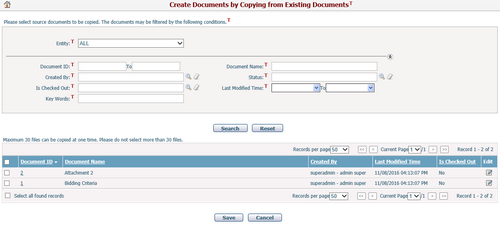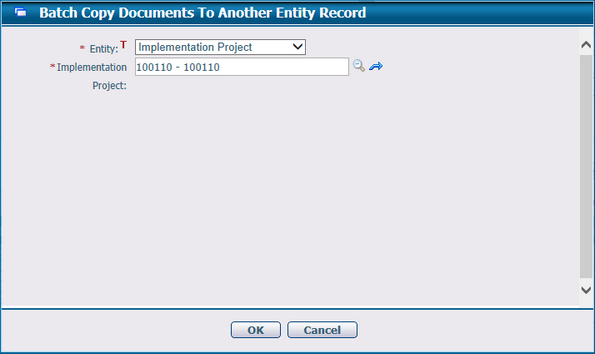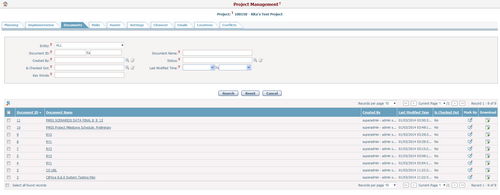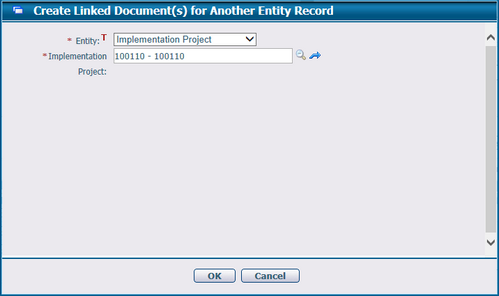Navigate Here: Implementation > Supplier Requests > Browse Contractor Requests for Information; select a RFI
You can edit the General Information and Related Information of a RFI on the Edit Request for Information (RFI) page.
This page is composed of two sections. The upper section contains the General Information of the RFI, and the lower section contains the Related Information of it.
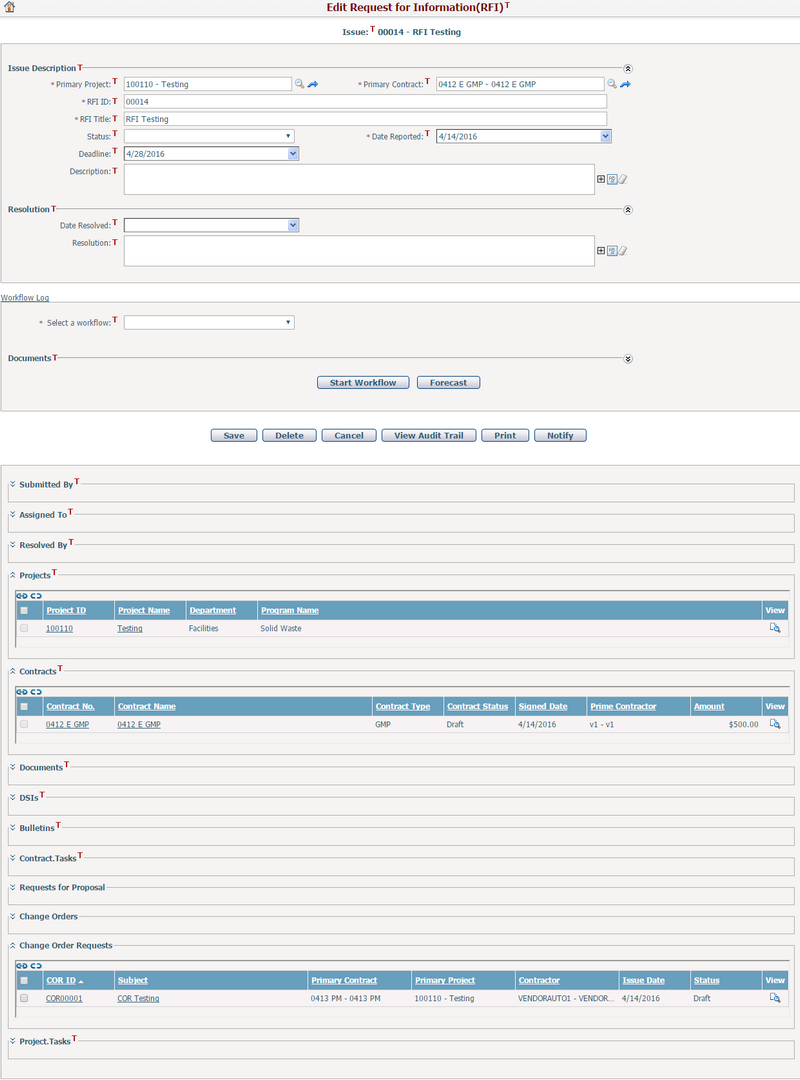
To edit the general information, update any of the following fields:
The required fields are noted with an asterisk (*).
Primary Project*: The primary project that the RFI is associated with. It is read-only.
Primary Contract*: The primary contract that the RFI is associated with. It is read-only.
RFI ID*: The ID of the RFI. It is auto-generated by the system and not editable.
RFI Title*: The subject of the RFI. It does not have to be unique.
Status: Select a status for the RFI. Authorized users can add or delete a customized status in Dropdown List Management.
Date Reported*: The date when the RFI is reported.
Deadline: The deadline when the RFI should be resolved.
Description: The description of the RFI.
Date Resolved: The date when the RFI is resolved.
Resolution: The resolution of the RFI.
Click the Save button to save the changes. The page will refresh and display the updated data.
Click the Delete button to delete the RFI. The Status will be triggered to Deleted and you cannot view this RFI on the Browse Requests for Information (RFIs) page.
Click the Cancel button to abort the current operation. The system will go to the Browse Requests for Information (RFIs) page. If you access this page from Manage Project Submittals tab or Manage Contract Submittals tab, the system will return to that page then.
Click the View Audit Trail button to view the change history of the current RFI. The system will open the Browse Audit Trail Details page in a new window.
Click the Print button to open the Generate Dynamic Document page where you can print the current RFI in Word or PDF format.
Click the Notify button to notify people about the RFI information. The system will then go to the Send Notification page.
Click the Submit button to trigger the workflow if a RFI workflow has been defined and set as Active. |
You can add and edit related information of the current RFI. Each subsection is collapsible. You can collapse or expand the contents of the subsection by clicking
Submitted By
Submitted By is the person(s) submitting the RFI. It ties to system Resources.
A brief summary of each Submitted By resource displays in the table. The summary includes Resource ID, Resource Name, Resource Type, Department, Associated User ID, Vendor Name, and Status (these columns in the data grid can be configured by Dynamic View). You may sort the records by clicking the linked column header.
You can view the detailed information of a resource by clicking
You can associate resource(s) as Submitted By with the current RFI by clicking
You can disassociate resource(s) as Submitted By from the current RFI by selecting the resource(s) and clicking
Assigned To
Assigned To is the person(s) designated to resolve the RFI. It ties to system Resources.
A brief summary of each Assigned To resource displays in the table. The summary includes Resource ID, Resource Name, Resource Type, Department, Associated User ID, Vendor Name, and Status (these columns in the data grid can be configured by Dynamic View). You may sort the records by clicking the linked column header.
You can view the detailed information of a resource by clicking
You can associate resource(s) as Assigned To with the current RFI by clicking
You can disassociate resource(s) as Assigned To from the current RFI by selecting the resource(s) and clicking
Resolved By
Resolved By is the person(s) resolving the RFI. It ties to system Resources.
A brief summary of each Resolved By resource displays in the table. The summary includes Resource ID, Resource Name, Resource Type, Department, Associated User ID, Vendor Name, and Status (these columns in the data grid can be configured by Dynamic View). You may sort the records by clicking the linked column header.
You can view the detailed information of a resource by clicking
You can associate resource(s) as Resolved By with the current RFI by clicking
You can disassociate resource(s) as Resolved By from the current RFI by selecting the resource(s) and clicking
Projects
The project(s) associated with the current RFI display in the table. A brief summary of each related project includes Project ID, Project Name, Department, and Program Name (these columns in the data grid can be configured by Dynamic View). You may sort the records by clicking the linked column header.
You can view the detailed information of a project by clicking
You can associate project(s) with the current RFI by clicking
You can disassociate project(s) with the current RFI by selecting the project(s) and clicking
Contracts
The contract(s) associated with the current RFI display in the table. A brief summary of each related contract includes Contract No., Contract Name, Type of Service, Contract Status, Signed Date, and Prime Contractor (these columns in the data grid can be configured by Dynamic View). You may sort the records by clicking the linked column header.
You can view the detailed information of a contract by clicking
You can associate contract(s) with the current RFI by clicking
You can disassociate contract(s) with the current RFI by selecting the contract(s) and clicking
Documents
A brief summary of each associated document displays in the table. The summary includes Document ID, Document Name, Created By, Last Modified Time, Is Checked Out, Is Linked Document, Mark Up and Download. You can sort the files by clicking the linked column headers. If there are too many records to display on one page, you can use the navigation control to view another page, or you may increase the number of records per page.
You can add an external document to the current RFI by clicking
You can delete multiple documents in batch by clicking the Batch Delete icon You can download documents in batch into the local path by clicking the Batch Download icon You can redline the document by clicking the Markup icon You can create document(s) to the current RFI via copying from existing document(s) by clicking the Batch Copy Documents In icon
You can find the documents you want by specifying the search conditions and pressing the Search button. Select the documents to be copied and click the Save button. New documents will be created for the current RFI. You can batch copy documents of the current RFI to another business entity record (as new documents) by selecting the specific documents and then clicking the Batch Copy Documents Out icon
You can create linked documents from existing documents in CIPAce to the current RFI by clicking the Create Linked Documents In icon
You can create linked documents to another entity record by clicking the Create Linked Documents Out
DSIs
The DSI(s) associated with the current RFI display in the table. A brief summary of each related DSI includes: DSI No., Subject, and Issuance Date (these columns in the data grid can be configured by Dynamic View). You may sort the records by clicking the linked column header.
You can view the detailed information of a DSI by clicking
You can associate DSI(s) with the current RFI by clicking
You can disassociate DSI(s) with the current RFI by selecting the DSI(s) and clicking
Bulletins
The Bulletin(s) associated with the current RFI are displayed in the table. A brief summary of each related Bulletin includes: Bulletin No. and Issuance Date (these columns in the data grid can be configured by Dynamic View). You may sort the records by clicking the linked column header.
You can view the detailed information of a Bulletin by clicking
You can associate Bulletin(s) with the current RFI by clicking
You can disassociate Bulletin(s) with the current RFI by selecting the Bulletin(s) and clicking
Project.Tasks
The Project.Task(s) associated with the current RFI are displayed in the table. A brief summary of each related Project.Task includes: Project, Task Name, Start Date, Finish Date and Percent Completed (these columns in the data grid can be configured by Dynamic View). You may sort the records by clicking the linked column header.
You can view the detailed information of a Project.Task by clicking
You can associate Project.Task(s) with the current RFI by clicking
You can disassociate Project.Task(s) with the current RFI by selecting the Project.Task(s) and clicking
Contract.Tasks
The Contract.Task(s) associated with the current RFI are displayed in the table. A brief summary of each related Contract.Task includes: Contract, Task Name, Start Date, Finish Date and Percent Completed (these columns in the data grid can be configured by Dynamic View). You may sort the records by clicking the linked column header.
You can view the detailed information of a Contract.Task by clicking
You can associate Contract.Task(s) with the current RFI by clicking
You can disassociate Contract.Task(s) with the current RFI by selecting the Contract.Task(s) and clicking
|
